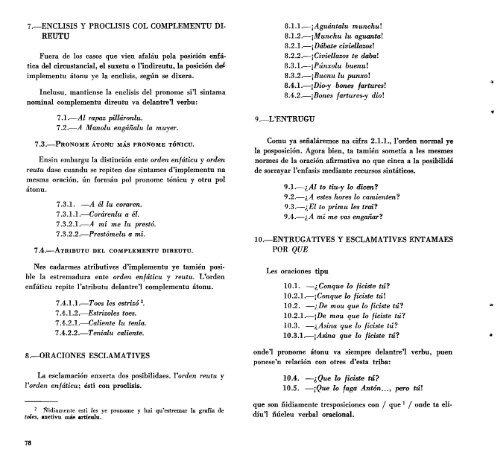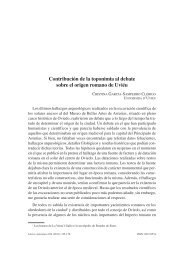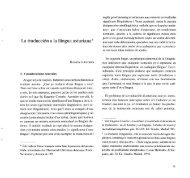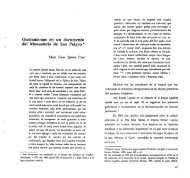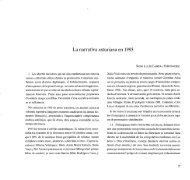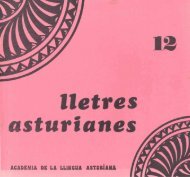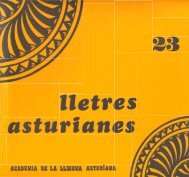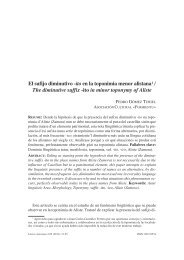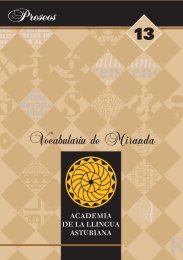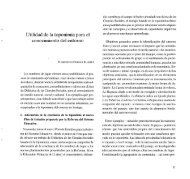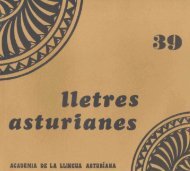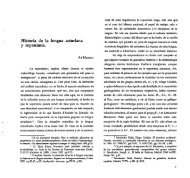Enclisis, proclisis y pronomes átonos - Academia de la Llingua ...
Enclisis, proclisis y pronomes átonos - Academia de la Llingua ...
Enclisis, proclisis y pronomes átonos - Academia de la Llingua ...
Create successful ePaper yourself
Turn your PDF publications into a flip-book with our unique Google optimized e-Paper software.
7.-ENCLISISREUTUY PROCLISIS COL COMPLEMENTU DI-Fuera <strong>de</strong> los casos que vien afaláu po<strong>la</strong> posición enfática<strong>de</strong>l circustancial, el suxetu o l'indireutu, <strong>la</strong> posición ddimplementu átonu ye <strong>la</strong> enclisis, según se dixera.Inclusu, mantiense <strong>la</strong> enclisis <strong>de</strong>l pronome si'l sintamanominal complementu direutu va <strong>de</strong><strong>la</strong>ntre'l verbu:7.1 .-Al rapaz pilláronlu.7.2.-A Manolu engáñalu <strong>la</strong> muyer.7.3.-PRONOME ÁTONU MÁS PRONOME TÓNICU.Ensin embargu <strong>la</strong> distinción ente or<strong>de</strong>n enfáticu y or<strong>de</strong>nreutu dase cuandu se repiten dos sintames d'implementu namesma oración, ún formáu pol pronome tónicu y otru polátonu.7.3.1. A él lu coraren.7.3.1.1 .-Corárenlu a él.7.3.2.1.-A mi me lu prestó.7.3.2.2.-Prestómelu a mi.7.4.-ATRIBUTU DEL COMPLEMENTU DIREUTU.Nes cadarmes atributives d'implementu ye tamién posible<strong>la</strong> estremadura ente or<strong>de</strong>n enfáticu y reutu. L'or<strong>de</strong>nenfáticu repite I'atributu <strong>de</strong><strong>la</strong>ntre'l complementu átonu.7.4.1.1,Toes les estrizó '.7.4.1.2 .-Estrizoles toes.7.4.3.1 .-Caliente lu tenh.7.4.2.2 .-Teni& caliente.8.ORACIONES ESCLAMATIVESLa esc<strong>la</strong>mación enxerta dos posibilidaes. I'or<strong>de</strong>n reutu yl'or<strong>de</strong>n enfkticu; ésti con <strong>proclisis</strong>.Ñidiamente esti les ye pronome y hai qu'estremar <strong>la</strong> grafía <strong>de</strong>t<strong>de</strong>s, axetivu más utículu.8.1.1 .-iAguántalu munchu!8.1.2.-iMunchu lu agucmtta!8.2.1 .-i Dábate civiel<strong>la</strong>zos!8.2.2 .-i Civiel<strong>la</strong>zos te daba!8 .S.l .-i Púnxolu buenu!8.3.2.-i Buenu lu punxo!8.4.1.-i Dio-y boms fartures!8.4.2.-iBones fartures-y dio!Comu ya señaláremos na cifra 2.1.1.' l'or<strong>de</strong>n normal ye<strong>la</strong> posposición. Agora bien, ta tamién sometía a les mesmesnormes <strong>de</strong> <strong>la</strong> oración afirmativa no que cinca a <strong>la</strong> posibilidá<strong>de</strong> sorrayar I'enfasis mediante recursos sintáticos.9.1.-?Al to tiu-y lo dicen?9.2 .-A A estes hores lo camienten?9.3 .-¿El to pnmu les trai?9.4.-i A mi me vas engañaz?10.-ENTRUGATIVESPOR QUELes oraciones tipuY ESCLAMATIVES ENTAMAES10.1. -¿Conque lo ficiste tú?10.2.1.-iConque lo ficiste tú!10.2. -;De mou que lo ficiste tú?10.2.1.-iDe mou que lo ficiste tú?10.3. -i Asina que lo ficisie tii?10.3.1.-iAsi~ que lo ficiste tú?on<strong>de</strong>'l pronome átonu va siempre <strong>de</strong><strong>la</strong>ntre'l verbu, puenponese'n re<strong>la</strong>ción con otres d'esta triba:10.4. -¿Que lo ficiste tú?10.5. -iQue lo fuga Antón.. ., pero tú!que son ñidiamente tresposiciones con / que ' / on<strong>de</strong> ta elidíu'lñúcleu verbal oracional.78


